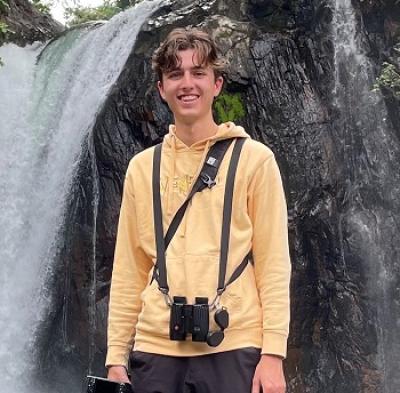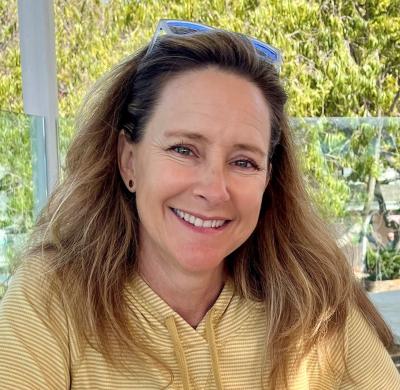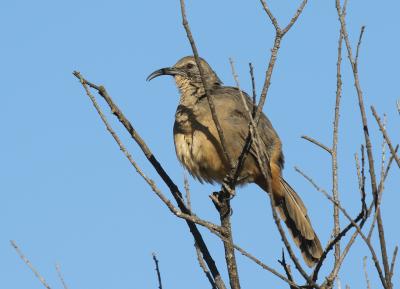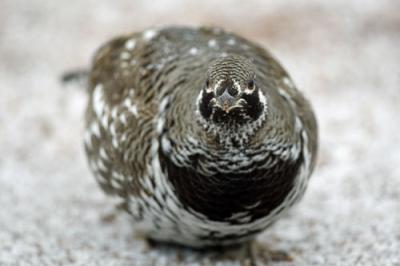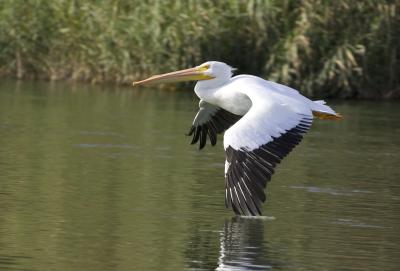Spring Migration in the Midwest
Eastern Wood Warblers
-
May 7-18, 2026
Jon Dunn and Ben Lucking
2026
Single Room Supplement $990
2026
Single Room Supplement $990
There may be no better place to witness the spring passage of songbirds than the Midwest. The three main eastern migration routes converge here and since the birds are nearing their breeding grounds the males are usually in full and vigorous song. With impressive, often spectacular numbers and diversity of migrants on the best days, the Midwest is certainly comparable to any other migration region in North America. Our tour takes in two prime locations for spring migrants, Crane Creek and the famous Magee Marsh Bird Trail at Ottawa NWR (Ohio), and Tawas Point on the west shore of Lake Huron in northern Michigan, and we also spend two full days in the Carolinian forests and grasslands of eastern Kentucky and southern Ohio, where we expect to find most of the southern breeding species. Between these sites, we should see a great majority of the eastern Neotropical landbird migrants, likely including as many as 35 species of warblers, including Swainson’s and Kirtland’s—and occasionally we see all 37 species as in 2023.
Day 1: The trip begins at 2:00 pm at our motel in Florence, Kentucky near Cincinnati, Ohio. After a quick introductory meeting, we will either visit Fernald Reserve, where we have our best chance of seeing Dickcissel at the eastern end of their regular breeding range, as well as Grasshopper Sparrow, Blue Grosbeak and Orchard Oriole. Alternatively, we might visit Capability Farm in Versailles, Indiana, an area maintained for birds which consist of both grassland and woodland habitats. The Northern Bobwhite, a declining species, is found here still in decent numbers, and we are likely to at least hear it. Henslow’s Sparrow is also possible and we found three here in 2019 and had good views of one in 2023. Night in Florence, Kentucky.
Days 2: We’ll depart early for the Red River Gorge east of Lexington, Kentucky in Daniel Boone National Forest, a breathtakingly beautiful place with its limestone and sandstone rock formations, some of which cross the Red River – all in a heavily forested environment. Along the way, we’ll drive through Kentucky’s “Blue Grass” and the fabled horse farms. Red River Gorge holds a few pairs of Swainson’s Warblers, here at the northern edge of their range, as well as many of the more southern warblers such as Blue-winged, Yellow-throated, Cerulean, Pine, Worm-eating, and Hooded and Louisiana Waterthrush. There is always the remote chance of seeing Ruffed Grouse. Acadian Flycatcher and Eastern Phoebe also breed here. The forest is noted, too, for its variety of butterflies, notable among them the striking Zebra Swallowtail, which should be numerous if the weather is warm and sunny. Heading north in the afternoon we’ll stop at an industrial park in a reclaimed strip mine in Greenup County, Kentucky, not far from Portsmouth where Henslow’s Sparrow still breeds along with Grasshopper Sparrow and species such as Prairie Warbler, Yellow-breasted Chat, Blue Grosbeak, Grasshopper Sparrow and maybe Dickcissel. Night in Portsmouth.
Day 3: We’ll spend much of the day in the beautiful and extensive Shawnee Forest close to Portsmouth, where nearly all of the southern Carolinian specialties are found in good numbers - Cerulean and Kentucky Warblers are almost common here – and we’ll probably find any we missed yesterday.
If we haven’t connected with Henslow’s Sparrow, we may try checking the fields in Adams County again on our second morning, or we may end up there late in the day in an early evening attempt for Chuck-will’s-widow, here at the regular northern end of its breeding range. Night in Portsmouth.
Day 4: We’ll depart for Crane Creek and the famed Magee Marsh Bird Trail on Lake Erie, and should arrive in time for some late afternoon birding at this premier location. By then the crowds of birders from earlier in the day should have diminished. Along the way, we may stop near Scioto Trail State Forest near Chillicothie whose forested ridges have many breeding species and can be full of migrants. Chillicothe was Ohio’s first capital from 1803-1810 and was again the capital from 1812-1816. Night in Oregon.
Days 5-6: Crane Creek and the Magee Marsh Trail are Ohio’s best migration spots. The spectacle is similar to the one at Pelee, but here the concentrations of migrants don’t seem to be as weather-dependent, and even on slower days there are usually plenty of birds. The narrow strip of woods along the lake is more open than at Pt. Pelee National Park in extreme southern Ontario, and migrants are delightfully visible. Here we can usually count on finding more secretive species such as Mourning Warbler, we typically encounter an American Woodcock or two sauntering and bobbing through the wet leaf litter. Here we have our best chance of Connecticut Warbler, although the odds are only about 10%, and it may be just heard. It is by far the hardest of the 37 species of wood warblers we hope to encounter during our tour.
Adjacent Ottawa National Wildlife Refuge has a variety of waterbirds, including shorebirds if water levels are appropriate, and the adjoining woods attract migrants. If we tire of migrants, the woodlands around Toledo have a number of breeding birds, including Acadian and Willow Flycatchers and Blue-winged and Pine Warblers; and nearby Oak Openings has breeding Lark Sparrows, their only regular location in the eastern Midwest. Red-headed Woodpecker breeds here too and this might be our only encounter with this striking and declining species. A few Summer Tanagers at the north end of their breeding range have recently summered here. Nights in Oregon.
Day 7: After a final morning of birding at Crane Creek, we’ll drive north to Grayling, Michigan. Along the way stops may include Pointe Mouillee State Game Area or Nayanquing Point State Wildlife Area. King Rail is possible at both, and Nayqanquing can be good for Yellow-headed Blackbird. This evening, there will be an optional after-dinner outing to Houghton Lake Wildlife Research Area, where Yellow Rail has held territory in recent years. Night in Grayling.
Day 8: This morning we will begin by exploring the sandy Jack Pine forests outside of Grayling. This is the epicenter of the Kirtland’s Warbler breeding range, and territories can be delightfully dense in the very specific habitat they rely upon. Upland Sandpipers and Brewer’s Blackbirds are both likely here too. Next, we’ll head North towards the iconic Mackinac Bridge, connecting the upper and lower peninsulas of Michigan. Before crossing, we’ll spend some time in a nearby flooded forest, home to breeding Golden-winged Warblers, as well as occasional Mourning and Canada Warblers. We’ll keep an eye on the skies here too, as raptor migration is fantastic in the vicinity of the bridge, with almost all raptors migrating through Michigan converging to cross into the Upper Peninsula here. After lunch in Mackinaw City, we’ll cross the bridge, immediately noticing the sparse population density and shift to boreal forest. We’ll make a quick stop at the nearby Point La Barbe. This can be a good lookout for lingering waterfowl such as Long-tailed Duck and Scoters and has also seen a number of vagrants over the years. Common Loon breeds here, so the night sky is often accompanied by their iconic haunting calls. Night in Trout Lake, Michigan.
Days 9-10: The Eastern Upper Peninsula is arguably the best birding anywhere in the Midwest. Whitefish Point is the crowning jewel, with an unparalleled track record of vagrants- everything from Shiny Cowbird to Bar-tailed Godwit has turned up in recent years. Eurasian Tree Sparrow is now annual in late May. What makes it truly special though is the migration spectacle on offer, it’s one of those rare sites that makes you realize that everything is migrating. Flocks of hundreds of Black-capped Chickadees can build up, occasionally joined by Boreal Chickadees. Thousands of Blue Jays overhead will fall in unison as Merlin’s bomb through. Warblers and finches are the often the focus early in the morning before raptors begin to build up over the hawkwatch platform. Among impressive numbers of more common raptors, American Goshawk and Golden Eagle are both regular sights through late May here. Piping Plover has also regularly bred on the beach in recent years. To top it off, there are none of the crowds found further South at sites like Magee Marsh. Lake Superior is the largest and wildest of the Great Lakes, and the picturesque wilderness along its shores makes it truly a pleasure to bird.
When we’re not birding Whitefish Point, we’ll be enjoying the enigmatic breeding species of the boreal forests. Spruce Grouse breeds at several sites near Trout Lake, often alongside Black-backed Woodpecker. A nearby spruce stand holds breeding Cape May Warblers alongside a healthy population of Evening Grosbeak. Though they can be tricky at times, this is the best site for Evening Grosbeak in Michigan. To the East, Munuscong Bay Wildlife Management Area is home to breeding American Bitterns and the occasional Least Bittern. LeConte’s Sparrow is also a tricky bird possible here. Although more difficult once they’re done lekking, Sharp-tailed Grouse are often findable on the roadsides here, often perched precariously on telephone wires. The nearby Pickford Sewage Lagoon can be productive with migrant waterfowl and shorebirds. It also supports the most consistent breeding population of Common Goldeneye in the state. Nights in Trout Lake, MI.
Day 11: After a final day of birding around the Eastern Upper Peninsula, we’ll drive South towards Detroit, stopping at one or more spots along the way. Night in Romulus, near Detroit.
Day 12: The tour concludes this morning in Romulus.
Note: The information presented below has been extracted from our formal General Information for this tour. It covers topics we feel potential registrants may wish to consider before booking space. The complete General Information for this tour will be sent to all tour registrants and of course supplemental information, if needed, is available from the WINGS office.
ENTERING THE UNITED STATES: Non-United States citizens will need a valid passport and may need a tourist visa. Consult your nearest U.S. Embassy or consulate for details.
PACE OF TOUR: The tour is moderately strenuous, with long days, early departures, and moderate walks. Most mornings we’ll depart an hour after dawn or shortly thereafter. The walks at Tawas Point State Park can be lengthy, a few miles at a time (round trip) and a small portion of it might be on sand. There will be few afternoon breaks other than driving between spots. Most days we try to end our birding by 7:00 p.m. We may on occasion offer additional birding after dinner. Still, we often don’t retire until after 9:00 p.m. so this tour can be tiring. The terrain is fairly level and usually along roads and pathways. On a few occasions, there will be the option of resting in the hotel rather than birding. However, if one has trouble walking, this tour will be difficult.
RESTROOM BREAKS: Restrooms and/or porta-potty breaks will be made available throughout the tour on most days. There will be a few days on tour when a restroom break in nature will be required if needed, so participants must be comfortable with this.
HEALTH: Kentucky, Michigan, and Ohio present no real hazards to the visiting birdwatcher.
Insects and Arachnids: Biting insects are occasionally a problem in northern Michigan and possibly elsewhere if it is a very early spring. It is best to have bug repellent along just in case. We recommend using insect repellents with a high concentration of DEET. Care must be taken, however, to avoid getting the DEET repellent on optical equipment as DEET dissolves rubber and plastic and can damage coated lenses. Camping supply stores and outfitters carry some reasonably effective alternatives, which contain natural products and aren’t corrosive.
Many birders are now using picaridin, which is just as effective as DEET but not as harmful to humans and optics.
Dog ticks are present in numbers in grassland areas throughout and it is best to check yourself carefully if we walk into a field. These large ticks are readily visible, unlike the smaller deer ticks, and usually take their time before trying to attach, so careful inspections after walking in tick areas is well advised. It is unclear how effective repellent is in keeping them off you.
Smoking: Smoking is prohibited in the vehicles or when the group is gathered for meals, checklists, etc. If you are sharing a room with a nonsmoker, please do not smoke in the room. If you smoke in the field, do so well away and downwind from the group. If any location where the group is gathered has a stricter policy than the WINGS policy, that stricter policy will prevail.
CLIMATE: Mid-May weather in the Midwest can be extremely variable with temperatures possibly ranging from the mid-30s (even high 20s) to the high 80s F. Some precipitation, perhaps heavy and possible as snow, is likely during the course of the week as various weather systems pass through and it can be windy as well. Bring warm clothes!
FOOD: Food is North American standard. Lunches will be a mix of picnics (as weather permits) and quick service restaurants.
WINGS tours are all-inclusive, and with the exception of WINGS tours to destinations in the US, no refunds can be issued for any tour meals participants choose to skip.
Food Allergies / Requirements: We cannot guarantee that all food allergies can be accommodated at every destination. Participants with significant food allergies or special dietary requirements should bring appropriate foods with them for those times when their needs cannot be met. Announced meal times are always approximate depending on how the day unfolds. Participants who need to eat according to a fixed schedule should bring supplemental food. Please contact the WINGS office if you have any questions.
TRANSPORTATION: We will be traveling by 15- [or 12-] passenger window van or minivan, depending on the group size. When using 15-passenger window vans, we will take a maximum of seven passengers plus the leader/driver. Participants should be able to ride in any seat in our tour vehicles.
PHOTOGRAPHY: Scenery and memory shots will be plentiful and simple to obtain but birds are difficult to photograph, though conditions at Magee Marsh and Tawas Point occasionally provide outstanding opportunities to photograph migrant eastern birds. We suggest a digital camera or a 35mm camera for scenes and for chance bird photographs. A telephoto lens is virtually essential for bird photography. “Digiscoping” is perfectly compatible with the tour, though you should bring your own spotting scope. Please be aware that birding tours do not provide the best conditions for bird photography as the group will move with the leader so may not be able to stay in locations for better lighting or a better view of the bird once everyone has had a chance to see the bird.
If you wish to ‘digiscope’ please ensure that you bring your own spotting scope; the leader’s scope will not be available for this purpose. Be certain to bring as many memory cards as you think you will use, as it may be difficult to find precisely what you need on short notice. Camera equipment should be packed in moisture- and dust-proof bags as a precaution.
2024 Narrative
In Summary
The ultimate migration tour was a total success recording all 37 eastern warblers (and a bonus hybrid) along with an impressive list of other migrants and resident birds. We began in the gorgeous Red River Gorge in eastern Kentucky where we quickly found our main target, Swainson’s Warbler, along with Kentucky, Cerulean, Worm-eating, and Hooded. Heading north Shawnee State Forest in Southern Ohio didn’t disappoint either with stunning forests set among the hilly Appalachian foothills, which offered some serene birding along quiet gravel roads where we were almost always the only people around.
Moving up to northwest Ohio and the renowned Magee Marsh, we spent several days enjoying migration along the famed boardwalk along with countless other natural areas in the region away from the crowds. Eventually we headed north into Michigan, where Tawas Point offered a daily dose of migration while nearby areas hosted Kirtland’s Warbler, Golden-winged Warbler, and a number of interesting local breeders.
The tour finished back in Detroit where our last stop was a mere 30 minutes from our hotel where we added Connecticut, the final warbler of the tour. An excellent way to end the tour!
In Detail
The tour commenced in the afternoon of the first day where we headed straight out for some birding before dinner. We visited the productive Fernald Preserve, which used to be a uranium metal products plant during the cold war. Since then, millions have been spent cleaning up the site and it’s now one of the best birding hotspots in the Cincinnati region. Our main goal was to track down the resident Henslow’s Sparrows.
We hit the trail and started checking off our first birds of the tour – Brown Thrasher, Eastern Bluebird, Field Sparrow, Yellow-breasted Chat, Orchard Oriole, Prairie Warbler, and Bobolink were all singing on territory. Reaching the sparrow site, it took a bit of patience but finally one of several individuals singing teed up offering good scope views for the whole group. On our walk back we added Yellow-billed Cuckoo, Carolina Chickadee, Willow Flycatcher, Wood Duck, and a flyover Broad-winged Hawk. Before departing, we walked a stretch of road where we had Northern Parula and Yellow-throated Warbler among others.
We crossed through miles of the Kentucky Bluegrass region the next morning before reaching Red River Gorge, an absolutely stunning site with forests set in rolling hills, serene running streams and brooks, and even a single-lane tunnel carved right through a hill. We walked a stretch of productive road where one of the very first birds we had was a singing Swainson’s Warbler teed up high in a tree, offering extended unobstructed views. An excellent start! By the end of our walk, we tallied 15 species of warbler including Worm-eating, Louisiana Waterthrush, Blue-winged, Kentucky, Hooded, and a dazzling Cerulean. There were, of course, other birds around too including White-eyed, Red-eyed and Yellow-throated Vireos, Swainson’s Thrush, and Scarlet Tanager.
After a delicious lunch at a local coffee shop, we began working our way north to southern Ohio stopping at the Minor E Clark Fish Hatchery. There were a few shorebirds around including Semipalmated Plover, Lesser Yellowlegs and Least Sandpiper. We also had a Green Heron, Osprey, a couple Belted Kingfishers, and Eastern Kingbird. We finished our couple hour drive north and checked into the Shawnee State Park Lodge with comfortable rooms looking into the expansive deciduous forests. After dinner we headed to the nearby Edge of the Appalachian Reserve, a Nature Conservancy property, where Ohio’s only known Chuck-will’s-widows breed. A storm was eminent, but we managed to hear one singing just before the clouds opened up. A calling Barred Owl was a nice addition.
With the lodge offering a late breakfast (to birders) at 8am, we met before and did a bit of birding around the lodge grounds. Several warblers were singing including our first Tennessee. We also picked out a Summer Tanager right from the deck. We then drove down the road to bird a rewarding stretch of gravel road. Eastern Wood-Pewees, Scarlet Tanagers, and Wood Thrushes were singing, and we got great visuals of an Acadian Flycatcher. However, the warblers stole the show once again with 16 species present, including our first Magnolia, Bay-breasted, and Blackpoll.
We headed into Portsmouth along the Ohio River for lunch before returning to the forest. We birded a stretch of road that traversed through forest, shrubland, farms, and grasslands, which offered an excellent diversity of species. One of the first birds we had upon getting out of the van was a pair of Blue Grosbeaks. We had over 50 species on this walk, picking up a couple Wild Turkeys, Cooper’s and Red-shouldered Hawks, and an abundance of Prairie Warblers and Yellow-breasted Chats. Another successful day that wasn’t yet over. After dinner we headed into the parking lot of the lodge where we had a chorus of Eastern Whip-poor-wills calling after dusk and an American Woodcock displaying.
With the lodge offering a late breakfast, we hit the road and picked up an excellent breakfast at a local coffee roastery en-route to our birding destination so we could break up the drive. We reached northwest Ohio and, after lunch, we made our first visit to the famous Magee Marsh boardwalk. There were a number of migrants around with our first Palm, Black-throated Blue, and Prothonotary Warblers, Lincoln’s and White-throated Sparrows, a cooperative Gray-cheeked Thrush, Red-headed Woodpecker, a roosting Common Nighthawk, and the resident Eastern Screech-Owl tucked away in its favorite tree.
We left the crowds behind and birded the woodlot behind the Ottawa National Wildlife Refuge. Migration was light but we still managed to spot one of the recently fledged Great Horned Owls that were raised in a hollowed-out tree. By now the wind was really picking up so we focused on Howard Marsh where we could do a lot of birding from the vehicle. Here we had Black-necked Stilts, Dunlin, Redhead, Ruddy Ducks, Caspian Tern, and a singing Marsh Wren. Our last stop of the day was the inland beach at Maumee Bay State Park hoping something of interest was around netting 30 Bonaparte’s Gulls.
An early rise the next morning found as at Metzger Marsh at dawn in order to see if we could hear any marsh birds. Luck was on our side with repeated calls from Virginia’s Rail, Soras, and an American Bittern. A Sandhill Crane was very vocal while Common Terns constantly flew by us returning to their nesting platforms with fish. We headed to the end of the road that dead ends at the lake where a small woodlot can often hold some good migrant action. On our way out we had American Pipits and Horned Larks along the entrance road.
We headed back to the Magee Marsh boardwalk to spend the remainder of the morning as this is the best place to see warblers up close and at eye level. This time around, these included Chestnut-sided, Blackburnian, and Wilson’s Warbler while Canada and Mourning were heard (to be seen later!).
After lunch at a local creamery, with 18 American White Pelicans circling above, we did some afternoon targeting birding. First up was a small nature preserve that protects some grassland in an area heavily dominated by agricultural fields where we found two Dickcissels along with Savannah and Grasshopper Sparrows. Nearby we birded a wildlife area that had a Clay-colored Sparrow singing. These are uncommon migrants and rare breeders so it will be interesting to see if it sticks around or moves on.
Howard Marsh finally produced a very distant Yellow-headed Blackbird, a local rare breeder restricted to this small area of northwest Ohio. Across the road in the new section, which is a big wetland today but was farmland just a couple years ago, yielded a good diversity of ducks and shorebirds including our first Northern Shoveler, Gadwall, American Wigeon, Black-bellied Plover, Short-billed Dowitcher, Greater Yellowlegs and locally rare Wilson’s Phalarope.
Winds seemed favorable overnight, so we headed to the Magee Marsh boardwalk the next morning for our final visit. We tallied 16 species of warblers including a gorgeous male Golden-winged. The beach produced our first Sanderling while a lone female Bufflehead floated offshore. Next door the Ottawa NWR woodlot quickly produced a singing Mourning Warbler which resulted in some of the best views I have ever had of this usually skulking species. This is also the single best place to see Veery and we did indeed have a couple.
Every year the various parks and wildlife areas take their turns on which are most productive, and this year Mallard Club Marsh Wildlife Area was leading the way. We walked a mile out specifically for some resident Black Terns and were rewarded with four circling over one of the flooded units. We also had our first Green-winged Teal and Sedge Wren and had superb views of a Broad-winged Hawk fly right over our heads.
Morning flight is a phenomenon where birds, which mainly migrate at night, continue migrating during the morning in search of suitable habitat and are usually concentrated along large bodies of water. In this case, Lake Erie. After a strong push overnight, we headed over to Metzger to see enjoy this movement from the coastal dike. A continuous stream of Eastern Kingbirds, Blue Jays, Cedar Waxwings, Indigo Bunting, and various warblers flew over our heads. The nearby trees hosted hungry migrants such a dozen warbler species, Swainson’s Thrushes, and Scarlet Tanagers while two Black Terns foraged over the marsh.
After getting our fix of migration, we began working our way north into Michigan stopping at Oak Openings first for Lark Sparrows. This is a rare breeder in Ohio, which is right at home in this beautiful metropark of open oak woodlands and prairies. In Michigan, we detoured to Pointe Mouillee for a reported King Rail, which was already calling upon arrival from a well-vegetated marsh. Before reaching Tawas Point for the night, we made one more stop at Nayanquing Point where we had a locally rare White-faced Ibis, our first American Black Ducks, and more views of Wilson’s Phalaropes and Yellow-headed Blackbirds.
We spent the next morning birding Tawas Point, a strip of land that juts out into Lake Heron, and acts as a migrant trap. Merlin, Pine Siskin, Orange-crowned and Cape May Warblers were all added while the point produced Hooded and Red-breasted Mergansers, flyby Common Loon and Long-tailed Ducks and a pair of Piping Plovers.
After lunch we headed inland to a Jack Pine forest for Kirtland’s Warbler, one of the key species of this tour! In minutes we were face to face with a gorgeous male as it sang right in front of us, with a couple more individuals singing nearby. We were able to spend some quality time with this special bird enjoying excellent up-close scope views and photographic opportunities. Before retiring for the day, we birded a few other sites picking up Yellow-bellied Sapsucker, Vesper Sparrow, and Upland Sandpiper.
After a first successful day at Tawas Point, we returned the following morning even earlier to take full advantage of the excellent birding. We tallied 84 species for the morning including 20 species of warblers! New birds included Common Merganser and a large flock of White-winged Scoters. We then headed inland to a productive wildlife area stopping for Brewer’s Blackbirds along the way. The rest of the afternoon was spent poking around a mix of deciduous and coniferous forests producing our first Red-breasted Nuthatch, Brown Creeper, and a surprise Brewster’s Warbler among a couple Golden-winged! A Snapping Turtle was our non-bird highlight for the day.
Our third morning at Tawas Point was slower and although we had a nice variety of birds including Black-bellied Plovers and Golden-winged Warblers among other migrants. We did however find a locally rare “Gambel’s” subspecies of White-crowned Sparrow. This subspecies occurs further west and sometimes can be found east of their usual range.
In the afternoon we headed back inland to get better photos of the Brewster’s Warbler and succeeded at that! We also had a singing Alder Flycatcher at the same location…our only individual for the whole trip. We headed back to Tawas Point before dinner to see a reported American Golden-Plover and had excellent views of it hanging out with several Black-bellied Plovers.
Our final morning at Tawas Point was probably our best in terms of migration. Favorable winds brough in a good number of warblers with Bay-breasted being the most common at around 30 individuals. We had a nice selection of other warblers to enjoy including our first Canada Warbler. Other highlights included a Philadelphia Vireo and a Common Nighthawk which was seen flying and eventually roosting on an exposed cottonwood branch.
Late morning, we got word of a Connecticut Warbler not far from our Detroit airport hotel. We left the Tawas Point area earlier than planned to target our last warbler of the tour. We got there just after 2pm and walked to the ravine that it had been hanging out at. Over the course of the next couple hours, we heard it sing a number of times, but it never did make an appearance. Nonetheless, it was still excellent detecting our final 37th warbler of the tour as a grand finale!
- Ethan Kistler, 2024
Maximum group size 9 with two leaders. Both leaders will join regardless of group size.


























